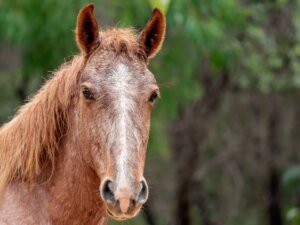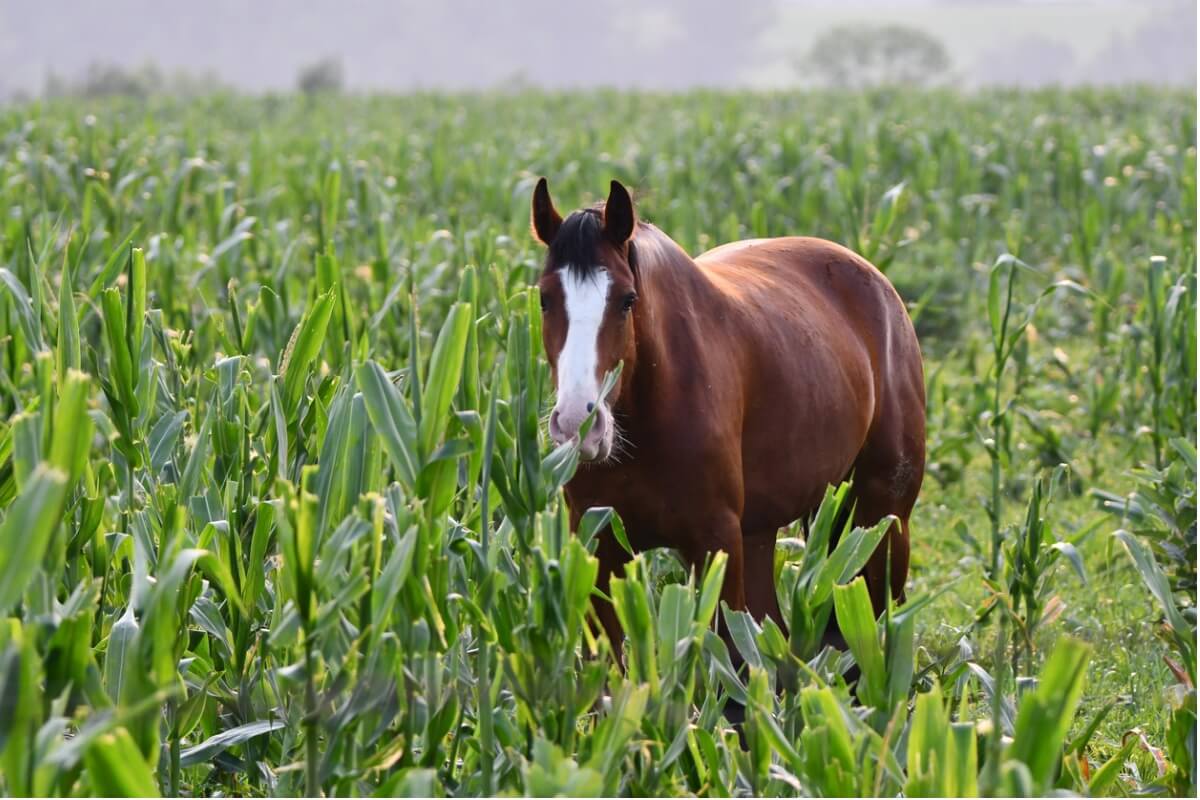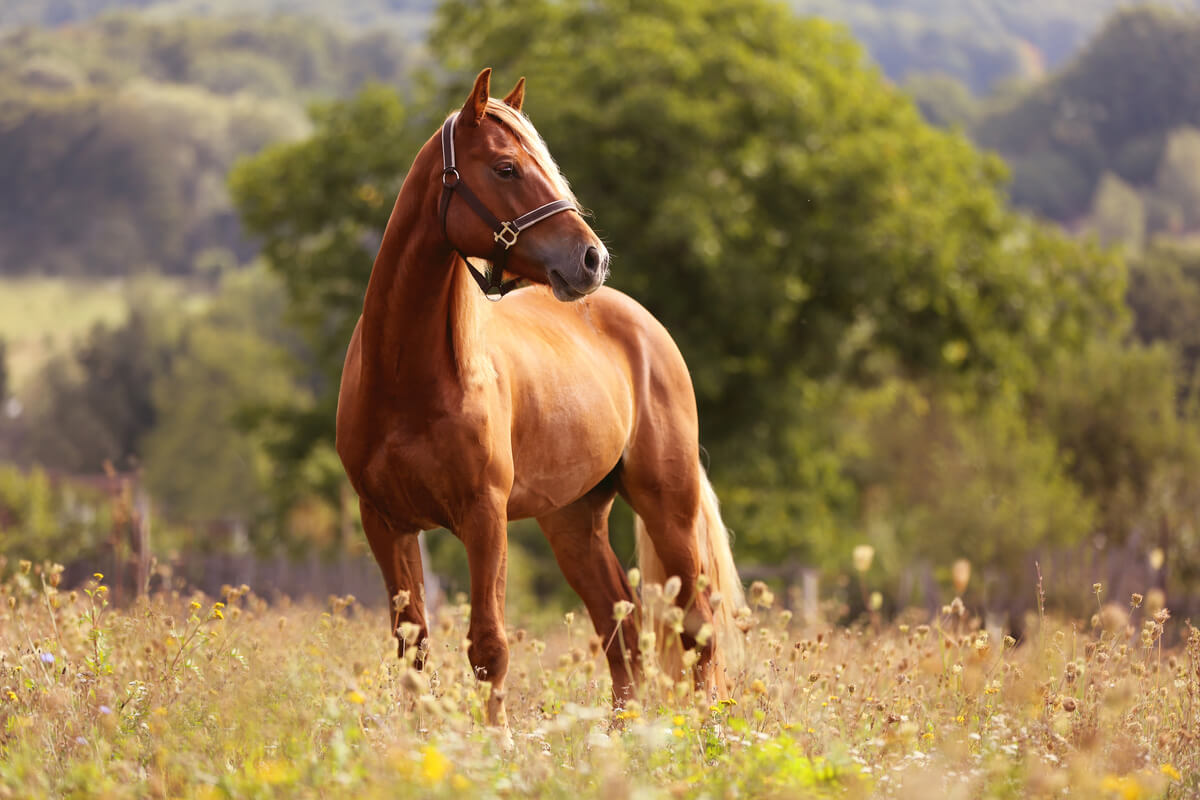How to Maintain Weight in Older Horses

Caring for an older animal always requires more attention than when they’re in their youth. Horses are no exception. Maintaining weight in older horses is a challenge for many, partly because the animal loses its appetite and also because its metabolism is no longer the same. Adequate weight will be what protects their joints and provides adequate defense against the cold.
So if your herbivorous friend is already graying, it’s time to start researching their senior diet. Here you’ll get useful information, as well as a series of tips to keep your horse at an optimal weight for its age. Don’t miss a thing, let’s get started.
When is a horse considered a senior?

The first question to ask yourself is whether your horse is starting to require senior care. Generally, a horse is considered geriatric at the age of 20 or older. However, the living conditions at that time and the health it has had throughout its life could condition this figure, both increasing and decreasing it.
A horse that lives in a sanctuary, for example, will probably have suffered mistreatment all its life and will show signs of old age earlier.
Therefore, old age in horses is calculated individually, always based on a reference, but taking into account when they started to show certain signs. Examples of this in horses would be dental wear, the ability to absorb nutrients in their intestine, and diseases such as renal failure.
Nutritional needs of an older horse
As you can imagine, an older horse will have nutritional needs according to its age and possible health problems. As a basis for maintaining weight in older horses, it should be taken into account that they consume between 1.5 to 2.5% of their weight per day in vegetable matter. However, there are 4 factors that must be controlled and they’re the following:
- The average weight of the horse
- What exact percentage of its weight the horse needs to eat
- The nutritional quality of the forage consumed
- Health problems that affect its nutritional status
How to maintain weight in older horses
With these basic notions in mind, let’s go through a series of tips to maintain optimal weight in older horses. The idea is that their weight won’t be too low or too high. As you’ll see, although it requires more effort and attention, it’s possible to take care of this aspect of their health effectively.
Monitor the horse’s weight regularly
The most basic advice is to weigh the horse regularly. In addition, pay attention to other signs, such as pain due to possible colic. Check to see if there’s an obvious drop in weight. This is the basic measure you want to monitor, so having up-to-date data on it is essential.
Choose high-quality forage
While this is important at any stage of life, it’s even more so in old age. It isn’t just a matter of choosing a good brand or supplier, but the type of forage should be tailored to the individual needs of the animal. Sometimes it’s necessary, for example, to add rice bran or flaxseed to provide extra fiber or a source of omega-3 and 6.
Never feed them grass clippings! It starts to ferment right away and they swallow it without chewing, so it predisposes them to colic.
Food supplements and special diets
It’s also possible that the horse may require specific foods included in its usual diet, due to some particular health condition. A horse with kidney problems, for example, shouldn’t take alfalfa or clover because of their high calcium content. Beet pulp is useful to aid digestion and sometimes the diet is supplemented with special feeds or mineral stones.
Any additions aimed at maintaining weight in older horses should be prescribed and supervised by a veterinarian.
Ways to feed an older horse
The way a horse is fed is as important as the food itself. Keep the following in mind:
- Stress should be avoided when feeding the horse: Competition with other horses, an excessive presence of flies, and other similar circumstances can affect the subsequent processing of nutrients.
- If the horse has a different diet than other animals in its group, it should be fed separately.
- It’s best to provide the daily amount of feed in small feedings throughout the day.
- Fresh water should always be provided ad libitum. In winter it shouldn’t be allowed to freeze or they’ll drink less.
Trust in the guidance of a veterinarian

Finally, the best advice you will find here is to enlist the help of a veterinarian specialized in equine medicine to maintain weight in older horses. Any personalized diet should be based on the specific health conditions of the animal and introduced gradually.
Therefore, if you’re concerned about your horse’s health, don’t hesitate to consult with experts to keep them in optimal condition.
All cited sources were thoroughly reviewed by our team to ensure their quality, reliability, currency, and validity. The bibliography of this article was considered reliable and of academic or scientific accuracy.
- How to Keep Weight on Older Horses. (2022, 22 diciembre). ASPCA. https://www.aspca.org/news/how-keep-weight-older-horses
- Barnes, A. (2022, 6 septiembre). Additional Care Recommendations For Older Horses. The Open Sanctuary Project. https://opensanctuary.org/special-recommendations-for-older-horses/
- Barnes, A. (2022b, noviembre 11). Advanced Topics In Horse Nutrition: Senior Horses. The Open Sanctuary Project. https://opensanctuary.org/advanced-topics-in-horse-nutrition-senior-horses/
- Barnes, A. (2022c, noviembre 11). Daily Diet, Treats And Supplements For Horses: The Basics. The Open Sanctuary Project. https://opensanctuary.org/daily-diet-treats-and-supplements-for-horses-the-basics/
This text is provided for informational purposes only and does not replace consultation with a professional. If in doubt, consult your specialist.